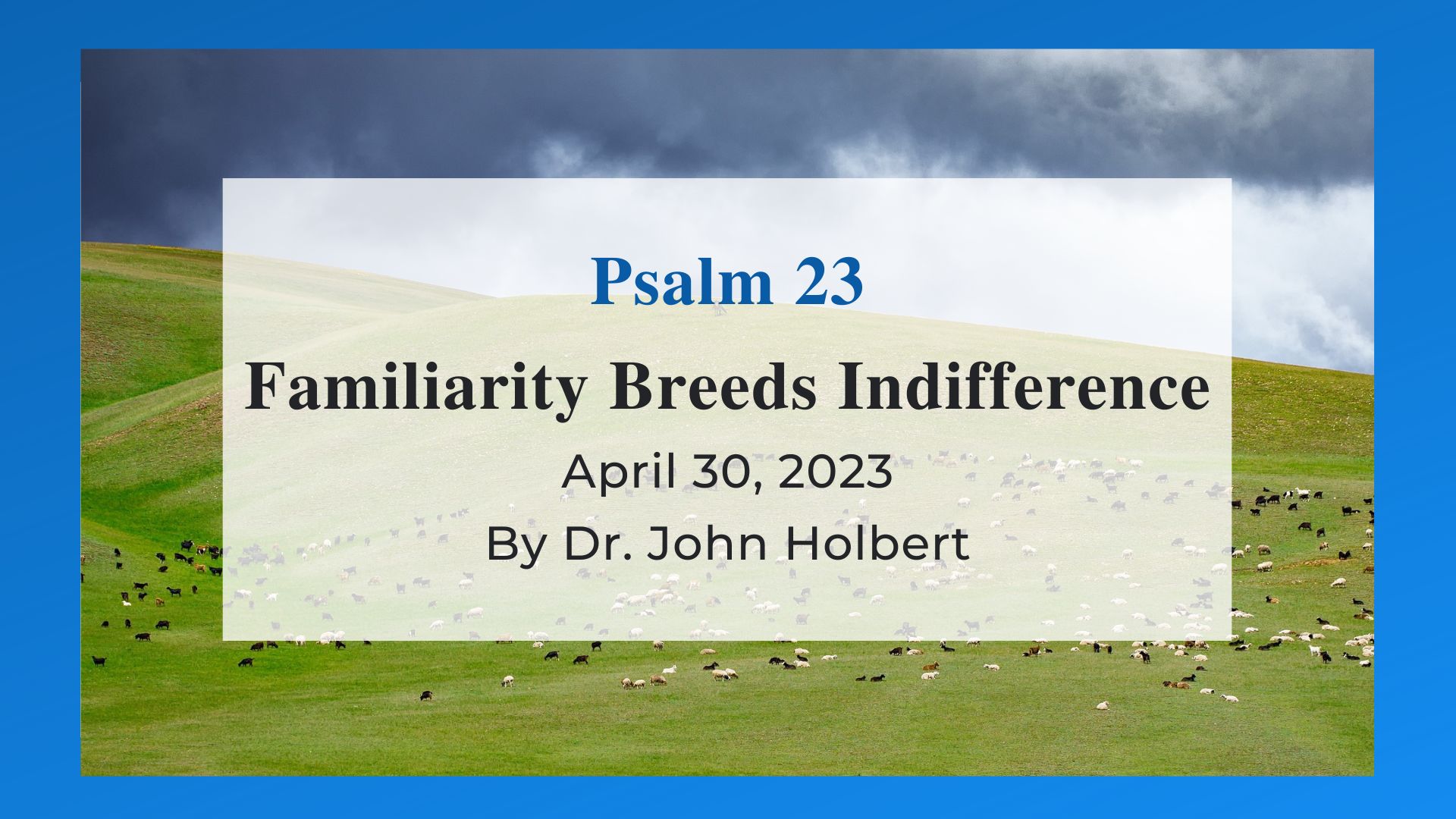Familiarity Breeds Indifference - Reflections on Psalm 23
by Dr. John Holbert on Monday, April 24, 2023

Familiarity Breeds Indifference
Psalm 23
The Peripatetic Hebrew Bible Preacher
Is it truly possible to say anything new about Ps.23? The reflection on this tiny piece of poetry, from the finest scholars to a book written by a real shepherd, is nothing less than staggering. I have never performed a funeral without using the psalm, and remain consistently surprised that nearly every person in attendance knows the song by heart, often in the KJV. And many of those reciting have not been in a worship service in years. The thing seems to float in the air and is inhaled by anyone and everyone. When we hear, “The Lord is my shepherd,” we know full well what comes next. But, as the saying goes, “familiarity breeds contempt,” (“and children” as Mark Twain waspishly added), but it also can breed indifference; I have heard this poem so many times that I have stopped listening to its words.
That indifference is a great mistake, I think, because this little poem is fairly riddled with powerful claims, hilarious assaults on human pride, and ambiguous meanings in any number of places. This short essay can hardly do justice to what this psalm includes. Let me point only to a few spots of preacherly interest.
1. It is crucial to know something about sheep to catch the import of the song. Sheep, if I may put it bluntly, are dumb as a box of rocks! One need only observe the little white darlings for a few hours to note that they have not a clue what they are doing, or where they are going, or what might happen to them in the next minute. I lived in the north of England for a year and was given ample opportunity to make such observations, and as I watched them, heads down, snouts stuck into the hinder quarters of their closest mates, eating and eating and eating, it was all too obvious that disaster was imminent. Wanderings right into the water, up mountain sides, or into highways were common, so when Jesus is later said to have been concerned with the 1 wandering and lost sheep at the expense of the 99, he knew whereof he spoke. Still, I have often wondered what an ancient shepherd would have made of that story, as Jesus hurtled after the stray, leaving the numerous others to fend for themselves and get into all sorts of mortal mischief. Thus, when the poem begins with its pastoral “YHWH is my shepherd; I lack nothing,” I need to understand that I have just been named an idiot, and without the Godly shepherd, I am doomed.
2. Psalm 23:4 offers an ancient mythological reference, lost completely in traditional translations. “Even though I walk through the darkest valley,” reads the NRSV, following the KJV’s “even though I walk through the valley of the shadow of death.” In reality, the KJV is closer to a literal translation, for the Hebrew text includes those very words, namely “valley,” “shadow,” and “death.” However, what the KJV translators could not have known, and what the NRSV translators should have known, is that the psalmist here refers to a mythological creature called tsalmaweth (literally: “shadow death”), a sort of valley troll, ever ready to attack anyone daring to venture into his territory. This figure appears in several ancient non-Israelite texts. I will be protected from this beast by YHWH, who is my shepherd. Dumb old me is certainly liable to wander into the troll’s clutches, being the foolish sheep I am.
3. Ps.23:5 presents an interesting conundrum. “You arrange a table before me near my enemies,” is one way to translate the phrase, but however it is read, the question is: how does this prepared table relate to those enemies? Are the enemies pictured as standing apart from the bounteous spread of table goodies, tongues hanging out, denied participation, or is the table spread precisely to invite those enemies to join in? Each reader of the poem must decide.
4. Last, though hardly least, is the final line: “I will dwell ( or “return”) in (or “to”) YHWH’s house for a length of days.” That appears to be what the Hebrew says, and if so, it will hardly do for a funeral! The venerated KJV’s “I will dwell in the house of the Lord forever” is the one we all say at those moments of death for obvious reasons. When I worked on the translations of the psalms for the 1989 United Methodist Hymnal, I read the final line: “I will dwell in the house of the Lord as long as I live.” One of the members of the central committee for the hymnal’s preparation said to me, “If you put that in the book, I will vote against the whole thing!” As a result, we compromised, placing my reading in the list of the psalms in the back of the book, but including the KJV elsewhere for those who desired its translation. I daresay that the KJV trumped Holbert every time! Still, I insist that the KJV’s translation is just plain wrong; the phrase they translated as “forever” just does not mean that, and I find myself pitted against over 400 years of Bible usage.
As you can see, there are several places in Ps.23 that require you to make some choices; the psalm may not be as familiar as you thought, and hence, it is more than worthy to share its unusual and unfamiliar riches with your congregation.
